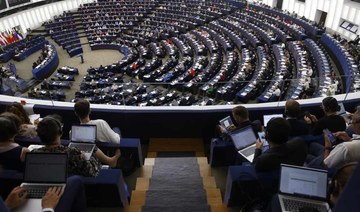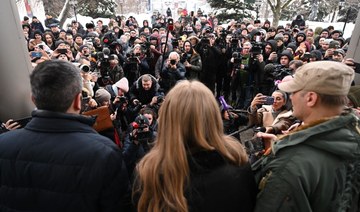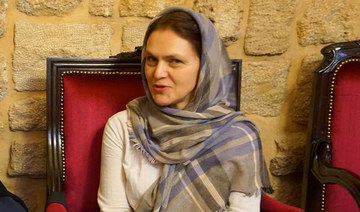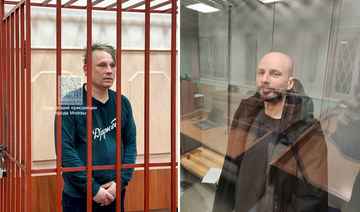BARCELONA: Qatar’s BeIN Media Group has rapidly expanded its Spanish subscriber base since winning the domestic broadcast rights for the country’s soccer league, but widespread illegal streaming blights the pay-TV sector and changing viewing habits are also eroding the business case for conventional sports coverage.
BeIN is the former sports division of Al-Jazeera. It broadcasts to 34 countries and is the lead soccer broadcaster in Spain, France, the Middle East and North Africa. Its rapid expansion has been unfettered by harsh austerity measures imposed on other Qatari state-run institutions that included massive job losses at Al-Jazeera following the energy price slump.
BeIN Sports launched in Spain in 2015, providing coverage of the Champions League and Europa League before partnering with Barcelona-based Mediapro to secure the principal domestic rights to La Liga — Europe’s strongest league — and the Spanish Cup for three seasons from 2016-17 onward, paying €1.9 billion.
The capture of La Liga rights was a blow to former telecoms monopoly and dominant broadband provider Movistar, which aimed to follow the model of Britain’s Sky in using sport to win both Internet and television subscribers.
“Even though the fees BeIN paid in Spain were quite considerable, generally the company has been cautious and does not go into a market and try to knock out every other bidder,” said Tim Westcott, senior principal analyst for TV programming at IHS Technology in London.
“They are almost certainly not profitable but I do not think they are paying ridiculous sums of money, at least on their TV operations. Their European business could be being bankrolled by the profitability of the core business in the Middle East.”
BeIN did not respond to questions from Arab News about the company and Mediapro declined to reveal their partnership’s commercial terms.
BeIN broadcasts eight of the 10 La Liga games each week, including at least one featuring Barcelona or Real Madrid, plus one Clasico game between this pair per season. That Real-Barcelona clause is crucial, with Spain’s Big Two dominating the league to an extent unseen elsewhere in Europe.
December’s Clasico attracted 2.2 million domestic viewers, nearly double the next most-watched game this season, according to Mediapro. In total, eight matches have drawn over 1 million viewers, all of which involved either Real or Barca. The highest-rated game not featuring this duo was October’s clash between Sevilla and Atletico Madrid, which attracted 0.77 million viewers.
Mediapro also provided audience data for two game weeks in mid-January. This showed the average audience for its 14 matches not including the Big Two was 0.3 million viewers. In a country of 49 million people, soccer accounts for 3 percent of Spain’s total TV audience, according to analysts Viewmetric, and a 5 percent decline in viewing figures in 2015-16 versus a season earlier mirrors trends elsewhere; the Premier League has suffered a 25 percent audience drop since 2010 despite the surging value of broadcast rights.
“Pay-TV companies do not necessarily measure their success in terms of viewers. The number of subscribers is what is important,” said Westcott.
“Inevitably matches involving the biggest two to three clubs get much bigger audiences, that is true in most leagues (but) I do not think they can ignore audiences because if people are not viewing the channels they are paying for they are less likely to continue with their subscriptions.”
BeIN says its Spanish channels have 4.5 million subscribers combined across all platforms, while Spain has about 15.3 million broadband subscribers.
The cost of BeIN packages varies and is usually sold as part of a broadband package, but the cheapest subscription is directly through the company at €9.99 per month. Prior to BeIN’s acquisition of La Liga rights, Spain was found to be the most expensive country in Europe to watch televised soccer because of the myriad pay-TV and pay-per-view subscriptions required to follow a team.
Such high costs in a country still recovering from the financial crisis may explain why illegal streaming in Spain is among the most widespread in Europe. A 2016 EU study showed 69 percent of Spanish 15- to 24-year-olds access digital content illegally, including sports.
“The effect of live streaming in sports broadcasting seems to be to reinforce the dominance of the first mover by weakening the scope for commercial challengers,” said Dr. Matthew David, a lecturer at England’s Durham University.
“There are many sports fans who cannot afford to see live matches, cannot afford TV subscriptions, do feel disaffected and will illegally stream in their millions but for those who can afford to pay it seems as though it is a badge of identity that they can be fans and be loyal to the commercial provider.”
Sky is also a broadband provider and has an extensive non-sports network of channels so is more immune to streaming, whereas pure-play sports broadcasters such as BeIN’s Spain operations are markedly more vulnerable.
“If you are not selling other products, only have the one product to sell and that product is freely available from someone else, then you are in a very vulnerable situation,” added David.
One-fifth of Spanish Internet users stream soccer illegally, La Liga told Arab News. In 2015, about 2 million homes illegally watched 141 million matches; the league estimates the value of these illicit transmissions at over 410 million euros.
“If there (is) audiovisual piracy, the market value could go down and damage revenue,” said a league spokesman.
It has developed tools to trace and analyze streaming websites and has launched a crackdown on hotels, restaurants and cafes showing such streams.
Broadcasters also face another challenge: The changing habits of viewers, especially younger audiences, who watch matches less intently and often use multiple screens simultaneously.
“There is no doubt people have shorter attention spans,” said Tim Crow, chief executive of Synergy, a London-based sports marketing agency.
“There is a lot of evidence younger fans would rather watch a highlights package or watch just a part of the game. Rights-holders and broadcasters are going to have to repackage the way they distribute and sell their content to adapt to those changing viewing behaviors and viewer demands.”
Younger adults seem less willing to pay hefty subscription fees for live sport and some broadcasters are beginning to question whether the huge sums TV rights command are justified, added IHS’s Westcott. “There is so much other content available online on services like Netflix that possibly people are saying sport is not the must-have content it used to be 10-15 years ago.”
Qatar’s BeIN TV network faces tough game in Spain
Qatar’s BeIN TV network faces tough game in Spain

EU bans 4 more Russian media outlets from broadcasting in the bloc, citing disinformation

- The EU has already suspended Russia Today and Sputnik among several other outlets since February 2022
BRUSSELS: The European Union on Friday banned four more Russian media outlets from broadcasting in the 27-nation bloc for what it calls the spread of propaganda about the invasion of Ukraine and disinformation as the EU heads into parliamentary elections in three weeks.
The latest batch of broadcasters consists of Voice of Europe, RIA Novosti, Izvestia and Rossiyskaya Gazeta, which the EU claims are all under control of the Kremlin. It said in a statement that the four are in particular targeting “European political parties, especially during election periods.”
Belgium already last month opened an investigation into suspected Russian interference in June’s Europe-wide elections, saying its country’s intelligence service has confirmed the existence of a network trying to undermine support for Ukraine.
The Czech government has imposed sanctions on a number of people after a pro-Russian influence operation was uncovered there. They are alleged to have approached members of the European Parliament and offered them money to promote Russian propaganda.
Since the war started in February 2022, the EU has already suspended Russia Today and Sputnik among several other outlets.
Israeli soldiers post abusive videos despite army’s pledge to act: BBC analysis

- The BBC analyzed 45 photos and videos posted online by Israeli soldiers that showed Palestinian prisoners in the West Bank being abused and humiliated
LONDON: Israeli soldiers continue to post videos of abuse against Palestinian detainees despite a military pledge to take action against the perpetrators, analysis by the BBC has found.
The broadcaster said it had analyzed 45 photos and videos posted online by Israeli soldiers that showed Palestinian prisoners in the West Bank being abused and humiliated. Some were draped in Israeli flags.
Experts say the footage and images, which showed Palestinians being stripped, beaten and blindfolded, could breach international law and amount to a war crime.
The Israel Defense Forces said some soldiers had been disciplined or suspended for “unacceptable behavior” but did not comment on the individual cases identified by the BBC.
The most recent investigation into social media misconduct by Israeli soldiers follows a previous inquiry in which BBC Verify confirmed Israeli soldiers had filmed Gazan detainees while beating them and then posted the material on social platforms.
The Israeli military has carried out arbitrary arrests across Gaza and the West Bank, including East Jerusalem, since the Hamas attack on Oct. 7. The number of Palestinian prisoners in the West Bank has since risen to more than 7,060 according to the Commission of Detainees’ Affairs and the Palestinian Prisoner Society.
Ori Givati, spokesperson for Breaking the Silence, a non-governmental organization for Israeli veterans working to expose wrongdoing in the IDF, told the BBC he was “far from shocked” to hear the misconduct was ongoing.
Blaming “current far-right political rhetoric in the country” for further encouraging the abuse, he added: “There are no repercussions. They [Israeli soldiers] get encouraged and supported by the highest ministers of the government.”
He said this played into a mindset already subscribed to by the military: “The culture in the military, when it comes to Palestinians, is that they are only targets. They are not human beings. This is how the military teaches you to behave.”
The BBC’s analysis found that the videos and photos it examined were posted by 11 soldiers of the Kfir Brigade, the largest infantry brigade in the IDF. None of them hid their identity.
The IDF did not respond when the BBC asked about the actions of the individual soldiers and whether they had been disciplined.
The BBC also attempted to contact the soldiers on social media. The organization was blocked by one, while none of the others responded.
Mark Ellis, executive director of the International Bar Association, urged an investigation into the incidents shown in the footage and called for the IDF to discipline those involved.
In response to the BBC’s investigation, the IDF said: “The IDF holds its soldiers to a professional standard … and investigates when behavior is not in line with the IDF’s values. In the event of unacceptable behavior, soldiers were disciplined and even suspended from reserve duty.
“Additionally, soldiers are instructed to avoid uploading footage of operational activities to social media networks.”
However, it did not acknowledge its pledge to act on BBC Verify’s earlier findings in Gaza, according to the broadcaster.
4 journalists killed in Gaza as death toll climbs above 100

- 104 Palestinian media workers reported dead, along with 3 Lebanese and 2 Israelis
LONDON: The Gaza Media Authority on Thursday said that four journalists had been killed in an Israeli airstrike, bringing the total number of journalists killed in the conflict to more than 100.
The victims were identified as Hail Al-Najjar, a video editor at the Al-Aqsa Media Network; Mahmoud Jahjouh, a photojournalist at the Palestine Post website; Moath Mustafa Al-Ghefari, a photojournalist at the Kanaan Land website and Palestinian Media Foundation; and Amina Mahmoud Hameed, a program presenter and editor at several media outlets, according to the Anadolu Agency.
The Gaza Media Office said the four were killed in an Israeli airstrike, but did not provide additional details on the circumstances surrounding their deaths.
A total of 104 Palestinian journalists have been killed since the conflict began on Oct. 7. Two Israeli and three Lebanese media workers also have been killed.
The latest loss adds to the already heavy toll on media workers, with the Committee to Protect Journalists saying the Gaza conflict is the deadliest for journalists and media workers since it began keeping records.
Israel is continuing its offensive on Gaza despite a UN Security Council resolution demanding an immediate ceasefire.
On Thursday, South Africa, which has brought a case accusing Israel of genocide to the International Court of Justice, urged the court to order Israel to halt its assault on Rafah.
According to Gaza medical authorities, more than 35,200 Palestinians have been killed, mostly women and children, and over 79,200 have been injured since early October when Israel launched its offensive following an attack by Hamas.
Russia outlaws SOTA opposition news outlet

- Authorities said outlet tries to destabilize the socio-political situation in Russia
- Move could criminalize SOTA content and puts its reporters at risk of arrest
LONDON: Russia declared opposition media outlet SOTA “undesirable” on Thursday, a move that could criminalize the sharing of its content and put its reporters at risk of arrest.
Authorities in Russia have declared dozens of news outlets, think tanks and non-profit organizations “undesirable” since 2015, a label rights groups say is designed to deter dissent.
In a statement, Russia’s Prosecutor General accused SOTA of “frank attempts to destabilize the socio-political situation in Russia” and “create tension and irritation in society.”
“Such activities, obviously encouraged by so-called Western inspirers, have the goal of undermining the spiritual and moral foundations of Russian society,” it said.
It also accused SOTA of co-operating with TV Rain and The Insider, two other independent Russian-language outlets based outside of the country that are linked to the opposition.
SOTA Project, which covers opposition protests and has been fiercely critical of the Kremlin, denied it had anything to do with TV Rain and The Insider and rejected the claims.
But it advised its followers in Russia to “remove reposts and links” to its materials to avoid the risk of prosecution. SOTA’s Telegram channel has around 137,000 subscribers.
“Law enforcement and courts consider publishing online to be a continuing offense. This means that you can be prosecuted for reposts from 2023, 2022, 2021,” it said.
SOTA Project was born out of a split with a separate news outlet called SOTAvision, which still covers the opposition but distanced itself from the prosecutors’ ruling on Thursday.
Since launching its offensive in Ukraine, Moscow has waged an unprecedented crackdown on dissent that rights groups have likened to Soviet-era mass repression.
Among other organizations labelled as “undesirable” in Russia are the World Wildlife Fund, Greenpeace, Transparency International and Radio Free Europe/Radio Liberty.
OpenAI strikes deal to bring Reddit content to ChatGPT

- Deal underscores Reddit’s attempt to diversify beyond its advertising business
- Content will be used to train AI models
LONDON: Reddit has partnered with OpenAI to bring its content to popular chatbot ChatGPT, the companies said on Thursday, sending the social media platform’s shares up 12 percent in extended trade.
The deal underscores Reddit’s attempt to diversify beyond its advertising business, and follows its recent partnership with Alphabet to make its content available for training Google’s AI models.
ChatGPT and other OpenAI products will use Reddit’s application programming interface, the means by which Reddit distributes its content, following the new partnership.
OpenAI will also become a Reddit advertising partner, the company said.
Ahead of Reddit’s March IPO, Reuters reported that Reddit struck its deal with Alphabet, worth about $60 million per year.
Investors view selling its data to train AI models as a key source of revenue beyond Reddit’s advertising business.
The social media company earlier this month reported strong revenue growth and improving profitability in the first earnings since its market debut, indicating that its Google deal and its push to grow its ads business were paying off.
Reddit’s shares rose 10.5 percent to $62.31 after the bell. As of Wednesday’s close, the stock is up nearly 12 percent since its market debut in March.

















